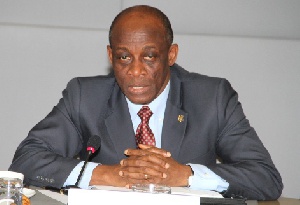 Minister of Finance, Seth Terpker
Minister of Finance, Seth Terpker
The Finance Minister, Seth Terkper has expressed confidence in a buoyant economy for the country if key measures taken by government to address the power challenges, sharp depreciation of the cedi, and effective debt management eventually begin to yield dividends.
Speaking at the forum in Accra under the theme ‘The Economy and Prospects of Business Confidence’, Mr. Terkper said that amid the various economic challenges faced by the country, there are positives the country can be proud of.
He said that the IMF in its current review of the bailout programme has expressed satisfaction about the progress of the economy so far and as a result given a green light to release the next tranche of the funds.
He further stated that as part of government’s home grown policy to bring the economy on track, all public servants have successfully been migrated to the Single Spine Salary Structure and some of the arrears have also been paid.
The Finance Minister admitted that it has not been rosy for managers of the economy since the last two years, as some external conditions have proved costly to the economy.
“We experienced a fall in commodity prices. Gold and cocoa prices fell and lowered the supply of foreign reserves to the central banks.
“During that period it took two-and-half years for the gas pipeline which was ruptured in Nigeria to be fixed for the gas to start flowing. And we know that the supply is still limited,” he said.
He added that the seasonal fall in the water level of the Akosombo Dam contributed to the major power disruptions, and this put the central bank in a difficult situation because the country had to rely on the importation of light crude -- thereby putting pressure on the bank’s reserves.
Mr. Terkper further stated that government has not ignored solutions to the power crisis that has proved costly to the economy so much in the last two years; rather, short- and long-term measures are in place by government to rectify the situation.
“From 2010, as a result of the economy’s expansion, we have seen the demand for power outstrip supply…This gap was opening gradually from a 2-year period and it was the power shortages from 2012 that drew attention to this. That is why when we analyse our power situation we should not analyse from a short-term perspective, but a structural change is going on that needs to be corrected,” he said.
He added that the government is committed to solving the energy situation, which is the reason why the powerships will soon arrive in the country to bolster the national grid.
Commenting on depreciation of the cedi, he called on the Bank of Ghana to strengthen its swap arrangements and ensure a more liberalised use of forex so that the reserves are not held captive by “people who have other motives for foreign currency”.
The Finance Minister decried the rate at which state institutions mount debts for government to pay, whereas those institutions could have serviced the debts by themselves.
“Most government entities are services and departments who statutorily are not allowed to make profits, so every expenditure of theirs are borne by the government. This is the basis of our saying let us change the trajectory. Let us give loans for these entities to pay back. That is how we paid for the Akosombo Dam and Tema Port in the first republic. So how come we cannot do same in the Fourth Republic? If we cannot do this, then we are not going to make progress,” he said.
He added that some of the state institutions have internally generated funds larger than the whole budget allocation of a ministry, and that should make it possible to finance their debt without necessarily burdening government with it.